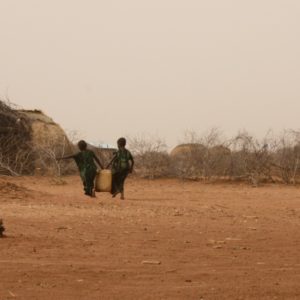The Stream, September 27: Water Evaporation Could Produce Huge Amounts of Renewable Energy
The Global Rundown
Devices that turn water evaporation into electricity could soon provide massive amounts of renewable energy. The Trump administration repealed a ban on disposable water bottles in U.S. National Parks despite a report that showed the ban was cutting back on plastic pollution. Educating people in India on the importance of good hygiene may help solve the country’s enduring sanitation issues. After months of lagging agricultural growth, a heatwave ripens crops across the Midwest U.S. Hurricane Maria decimates 80 percent of crop value in Puerto Rico.
“There will be no food in Puerto Rico. There is no more agriculture in Puerto Rico. And there won’t be any for a year or longer.” — José A. Rivera, a plantain farmer, in reference to Hurricane Maria’s widespread destruction of Puerto Rican crops. The Category 4 storm was one of the costliest hurricanes ever to hit the island’s agricultural industry, wiping out an estimated $780 million in agricultural yields. The New York Times
By The Numbers
111,743 pounds Amount of plastic that was prevented from being used and discarded each year thanks to the U.S. National Park Service’s disposable water bottle ban, according to a recently-publicized report. The report was made available to the Trump administration in May, but the administration still chose to repeal the water bottle ban this summer. The Guardian
10 percent Proportion of deaths in India that are caused by poor sanitation, according to World Bank estimates. 450 million people in the country practice open defecation, and 300,000 children die each year from diarrheal diseases. Although toilets are becoming more widespread in the country, they often go unused due to a lack of knowledge about proper sanitation and latrine use. Educating people in this area could be a key part of improving the country’s sanitation. The Economist
In context: SDG report: Billions lack safe drinking water and sanitation at home.
Science, Studies, And Reports
Water evaporation could be a major source of future renewable energy, according to a report published by Columbia University. Researchers are developing a device capable of turning water evaporation into electricity, but the researchers cautioned that harnessing this energy source could affect water quality. The Independent
On The Radar
After months of lackluster crop development, unusually hot weather is boosting corn and soy crop maturity in the Midwest United States. In many areas, temperatures over the past week have ranged between 90 and 100 degrees Fahrenheit. There has also been lower-than-average precipitation, allowing farmers to harvest uninterrupted. Reuters
Kayla Ritter is a recent graduate of Michigan State University, where she studied International Relations and Teaching English to Speakers of Other Languages. She is currently based in Manton, Michigan. Kayla enjoys running, writing, and traveling. Contact Kayla Ritter





